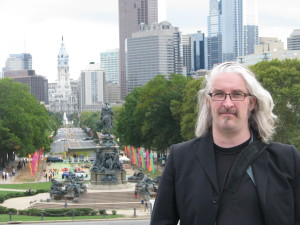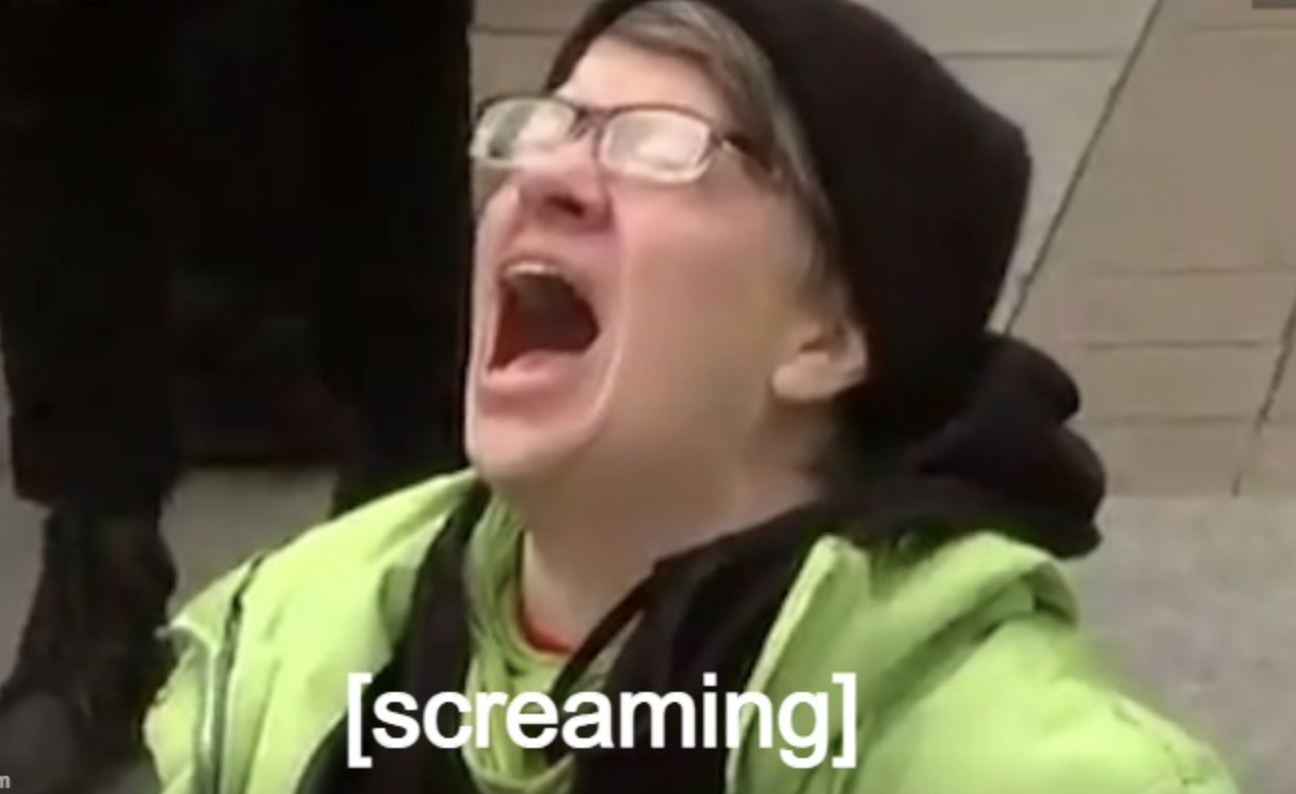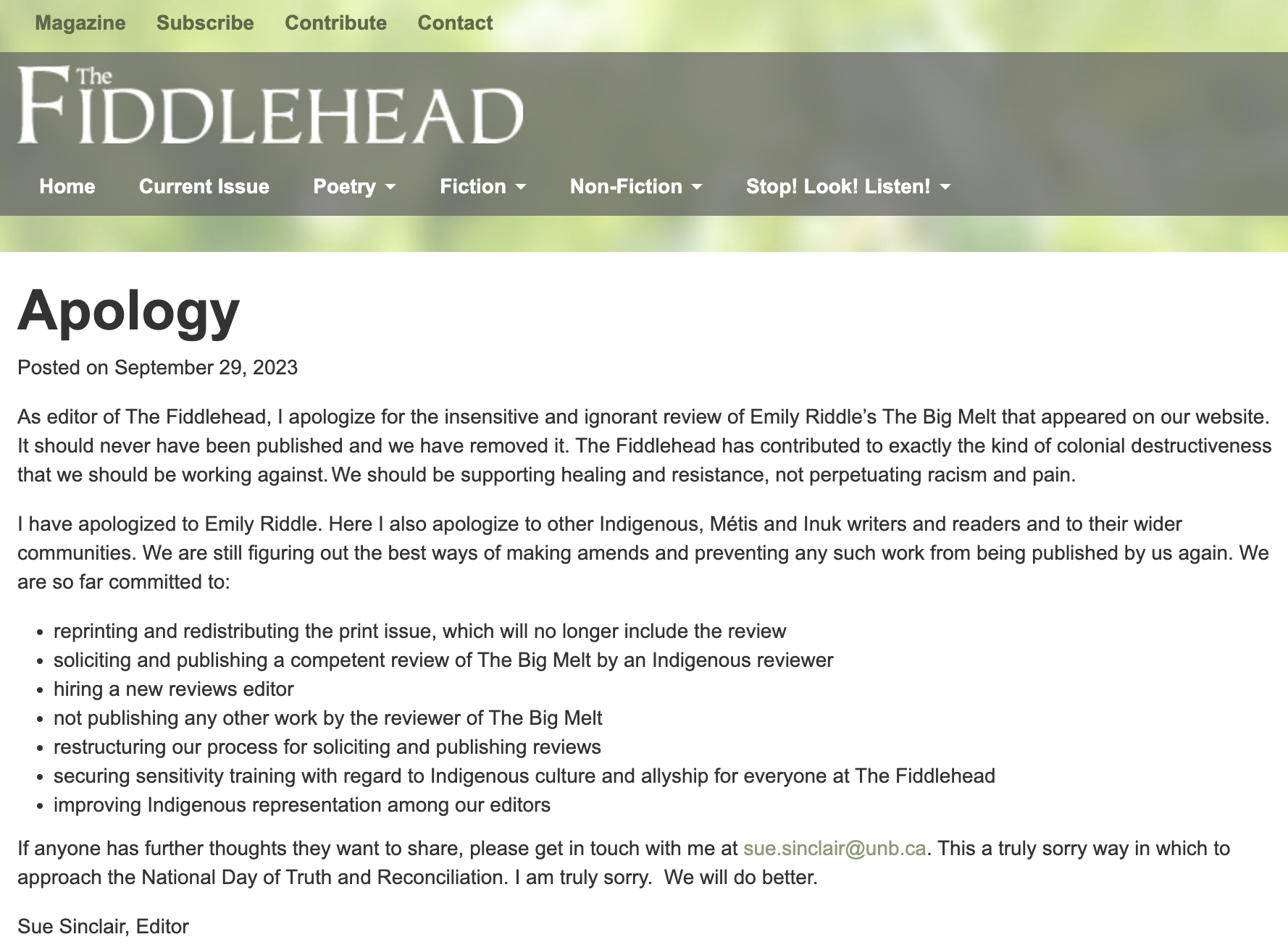I’ll let Cameron Anstee’s excellent blog post serve as a bio. Note the lengthy interview at the end, which covers rob’s activities since the beginning. rob is a publisher, editor, blogger, reading series and small press book fair organizer, fiction/non-fiction writer and poet, who’s been a major part of the writing scene in Ottawa for a very long time.
OM: You’re rob mclennan, not Rob McLennan. What does the lowercase signify?
rm: I suspect that part of the original impetus might have had something to do with attempting to distinguish myself from family, but my early-twentysomething reasoning was that it was less about me, and more about the work. Now I just think it looks sleek, cool.
OM: What’s the percentage breakdown of time spent on your own writing, blogging, reviewing, publishing, and reading? Would you like to spend more time on your own work, or are you happy to have a balance of activities?
rm: The balance has always been fluid, working on little bits of a variety of things at any given time, although that’s been more tricky since I’ve been full-time with toddler (and new/final baby set to emerge any day). With the birth of our Rose in November 2013, I’ve gone from writing full time—which allows for an hour or two on reviews, an hour or three on fiction, poetry, etcetera—to writing in fits and starts, such as during her afternoon nap (for as long as that still lasts), and her two mornings a week at ‘school.’ These days I might complete two reviews during one of my mornings (completely unable to do anything else, writing-wise), and then poke at a couple of other things, including reading, during her nap.
I’ve been noticing over the past few months that what I end up squeezing out for sheer time has been the writing, over all else, which I find enormously frustrating. Still, I did decide to have more children ‘with eyes open,’ and know I really don’t have to wait that long before Rose (and her soon-sibling) begin school full-time. It goes by so quickly, and I’m allowing myself to enjoy the process. That being said, I’ve been trying to get a manuscript of short stories completed ‘this year’ now for three straight years. I haven’t given up on getting a finished manuscript out the door in 2016. Once that is out the door, I can return to cleaning up my post-mother creative non-fiction work, and then dig into the novel that I haven’t looked at in five years. Poems are intermittent, and deliberately so: I’m pushing to complete the fiction, even as a poetry manuscript can’t help but shape itself.
OM: You seem to have come at self-promotion from every possible angle. What has been most effective in putting your work, and the work of others, in front of readers?
rm: I think the most effective thing has been the fact that I don’t rely solely on one way in which to inform people. Some might notice via my email list, others might via FB or blog, while even others via Twitter. For some, it’s the physical table of books at a small press fair, whether Ottawa or, occasionally, Toronto. I often mail chapbook handouts to book fairs in other parts of North America as well, something I’ve been doing for a decade or so now. I sent fifty copies of a new Renée Saklikar above/ground press chapbook as handout at the recent Buffalo Small Press Book Fair, and fifty copies of the new lary timewell above/ground press chapbook to Louisiana, for Marthe Reed to hand out at the New Orleans Poetry Festival. I like the idea of books making it to events that I can’t, and I know if I attempt to sell physical copies through someone else, it just becomes more complicated, especially with authors that most audiences at those events wouldn’t know too much about.
I think if I hadn’t been writing/publishing, I wouldn’t have bothered with twitter. I have two accounts, if you can imagine: one for me, and another for Chaudiere Books.
I think if you are attempting to disseminate information, the worst thing you can do is only pay attention to the ways in which you, yourself, gather information. If you want the news to travel, you have to be more open to what people actually pay attention to. That being said, I haven’t been able to even conceive the time to throw Chaudiere Books into Pinterest, for example. I’ve been attempting to convince Christine of such, given she’s already on there herself.
OM: Given your vast array of ongoing projects, it’s a massive understatement to say you’re busy. How do you find the time to do all the things you do? How you balance other areas of your life that compete for your attention? What’s your secret to relentless productivity? Coffee? Cocaine? Have you cloned yourself?
rm: Constant attention. And, given I’m home with toddler, I am rarely not moving. Even during most evenings in front of the television, I am either folding and stapling chapbooks, or posting interviews in my ongoing “12 or 20 questions” series. Touch the Donkey interviews, for the most part, can be worked on at any point during my day. The bulk of responses can be absorbed relatively quickly, with a new question sent out even as the young lady plays quietly in the living room, or eats her lunch beside me. I attempt to do all of my housework and baking and laundry etcetera while she is awake (in part, so she understands the function of housework, and perhaps doesn’t grow up afraid of it; I don’t want her imagining that it all gets done secretly, and possibly by magic elves, as she sleeps), so that when I am at my desk, I am writing: poetry, fiction, reviews, essays. When she is asleep or at school (or with Christine), I want to focus on the things I couldn’t at all do if she were around.
When I am at my desk, sometimes the hardest possible thing is to be actually writing. But I do my best. What is that quote about writing being not what is easiest for a writer, but the most difficult?
I also attempt to be organized. I’ve been self-maintaining for twenty-plus years, and am mostly on top of things through working so far in advance. That way, I can work in little bursts when energy and attention allow, and I never feel as though I’m behind and scrambling (this also means if something else comes up to interrupt, including my own exhaustion, I am still on schedule). I start soliciting for my annual Ottawa poetry pdf journal ottawater in April for an October deadline, attempt to get the issue to the designer in December for the sake of posting a new issue in January. I attempt to book the spring edition of the ottawa small press book fair in January, and the fall edition in July. I’m working to keep a year ahead on both content and interviews for the quarterly poetry journal Touch the Donkey. I’m usually two months ahead in the “On Writing” series I’ve been curating over at the ottawa poetry newsletter, with new essays posting every 1.5 to 2.5 weeks. For the “Tuesday poem” series over at the dusie blog, I curate in six month blocks, and should have the entirety of 2016 scheduled before the end of May.
I’m currently three months ahead on the “12 or 20 questions” series as well, and about a month ahead on reviews for the blog, but much of that has to do with the imminent arrival of new baby. I need to be able to carve out the space of at least a few weeks (if not three months) in which to be exhausted, focusing instead on newborn and lack of sleep and maybe laundry and perhaps even feeding ourselves. I suspect there will be no energy for anything else.
OM: What are the rules of Facebook? I think posts have the best chance of a good reception if they’re personal and positive, a homepage is a bad place for a fight, posts should rarely exceed one per day, and meal shots and inspirational posters should be kept to a minimum. Sometimes I find an article that seems too interesting, or horrifying, or important to ignore, but I think most people consider links to articles with which I have no personal connection to be spam, regardless of content. What are your rules?
rm: Given my account is personal and not professional, I basically post as I wish: things that intrigue, anger or amuse. All of my blogs—rob mclennan’s blog, Touch the Donkey, above/ground press, dusie, Chaudiere Books, the ottawa poetry newsletter and the ottawa small press book fair—all post to my facebook feed (and to a couple of others, such as each blog’s individual group, for example). One benefit to FB is knowing that anything can also be ignored, so I never worry about filling anyone’s feed (I also work to space my variety of blog posts apart, whether hours or days, so as to not overwhelm).
OM: Someone who posts ten times a day runs the risk of being banished to “hidden post” limbo. I post when I find something interesting (rare) or something significant has happened in my life (very rare). Where is the balance with the frequency of posts?
rm: I don’t know if I’ve ever had ten posts in a day. Maybe during the Harper years, when I was angry much of the time. I also have work to do, you know.
OM: With over 5000 FB friends, and a long history of promoting your work and the work of others, your FB profile has transformed into a hub, a meeting place. Someone could use it as a directory of writers in Canada. Obviously, there’s plenty of interaction between you and your FB friends, but do connections flourish between your FB friends?
rm: I would say it does. There are certain people I hadn’t really interacted with until FB, which has allowed for certain conversations and interactions to occur, which I’ve quite appreciated. A number of friendships have flourished, while others have sparked (I’d much rather see people in person, if possible). I’ve seen more than a couple of folk over the years grieve rather publicly, which has prompted me in my own way to reach out and attempt to provide some support. Certainly, the nature of FB can provide a false sense of intimacy with a great many people, as you watch what they post scroll by, but it is in the nature of how you interact that provides any real connection. Certainly, given I’ve had ‘maximum’ as far as friends for quite a long time, there are tons of posts I don’t even see on my feed (I keep having to ‘unfollow’ folk just so I can keep seeing posts by those I wish to pay attention to). I keep having to check out my wife’s page, for example, given FB doesn’t think I automatically want to keep up with anything she does.
I also utilize FB as a source of information: new books, chapbooks, calls for submissions, that sort of thing. When I see someone I know post information on someone I don’t – ie. Person X has a new book! You should check it out! – I often do check it out, if I can. It often leads to me querying the author for a potential “12 or 20 questions” interview, which also allows for the possibility of a review copy. I’ve also discovered numerous publishers that way, which I attempt to include in my “12 or 20 (small press) questions” series. The potential for new information is incredible.
OM: I’ve pissed off many people, perhaps ruined a few relationships, due to my slow response times to texts, emails, and posts. When I receive a long email from a friend, I like to take my time with it, let it age, think about what was said, and carefully consider my response. This seems completely incompatible with what people now expect from digital communications. Slow now has no value and is considered an almost unforgivable offence. When I first launched my blog, you “liked” it immediately after I posted. When I asked you for an interview, you responded within one minute. Is an instant response a policy decision on your part, or is it simply a habit?
rm: What can I say? I mean, I’m sitting right here.
I’m often online, floating in and out of laptop even as toddler eats meals, or watches one of her stories (and yet I am very aware of wanting to be ‘present’ for her). I know that if I don’t respond immediately, when I think of it, I will completely forget. If I don’t respond to an email as soon as possible, it is very easy for the email to suddenly sit for weeks before I discover I never responded, if at all. Once things fall away, they’re gone.
Which means to say: I think it is a conscious decision (“policy” simply means “guideline,” after all, as opposed to “fixed law”) that has adapted itself into habit.
To do something now means I don’t have a pile of things to get to later. A pile is far more intimidating than simply responding to things as they come up.
OM: Is it time to switch to a fan page? For me, the whole point of Facebook is interaction. Having a fan page seems closer to broadcasting, a one way flow of information and opinion. Why do you think profiles are limited to 5000 friends? Do you try to manage that limit? Is there a periodic culling process to make room for new or more active friends? When people try to friend you, do they receive a notice that you’ve reached your limit?
rm: I’ve had an author page for a few years now, where I post more specifically on my creative output. There are also specific pages/groups for Chaudiere Books, the ottawa small press book fair, above/ground press and Touch the Donkey, if one chooses to ignore me personally, but wishes to remain informed on a particular thread of my activity.
I remember Jack Layton complaining to FB about the same issue, when he reached his limit of 5000. He wanted to interact, and not announce or pronounce from on high. My main purpose on FB is to interact in the conversation of living, being, writing and reading (etcetera), which means I would hold to my regular FB account over the fan page. But I understand the uses and purpose of the fan page, which is why I also have one. I do less over there.
OM: What about haters and trolls? I’ve seen other blogs torn apart due to lack of moderation. I tend to think any thoughtful, intelligent comment should be allowed, no matter how negative, but vitriol minus content equals deletion. Do you have much experience with this? What’s the best way to handle it?
rm: As you suggest: moderation. And yet, most of what requires blog moderation is spam. I so rarely get comments at all, and even fewer negative ones. But yes, I’ve occasionally allowed negative comments to post (but never vitriolic; if you can’t be respectful, even if your comments have compelling weight, I refuse to engage). I would rather the conversation.
Every year or so, I have to block someone for a variety of reasons, usually when someone attempts to spout their venom at me (often for reasons that have nothing to do with me), whether over email, FB or on one of the blogs. I simply block and ignore. I have far better things to do.
Links to the mclennan empire
http://www.robmclennan.blogspot.ca/
http://abovegroundpress.blogspot.ca/





Leave A Comment